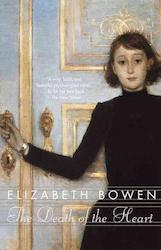
The Death of the Heart is often hailed as a 20th-Century masterpiece. The Modern Library includes it among the 100 Best Novels. The reason I’m reading it now is because it’s included on Pop Chart Labs’s wonderful scratch-off poster of 100 Essential Novels. Written in 1938, it is usually considered to be Elizabeth Bowen’s finest novel. So my opinion here is clearly in the minority, but I am not a fan.
Set in the period between World Wars, the story–if you can say there’s a story–revolves around Portia, a 16-year-old girl who has recently been orphaned and moves to London to spend a year with her older half-brother, Thomas, and his wife, Anna. It's a book about the loss of innocence, but only two things happen in the novel. First, Portia becomes smitten with a friend of Anna’s, Eddie, who is 23 and flirts and toys with her affections, but ultimately rejects her without taking advantage of her sexually. And second, Portia’s feelings are hurt when she discovers Anna has read her diary. That’s it. No real drama. No real trauma.
Many excellent books have been written on such a basis, however. So I won’t fault Bowen for a limited range of drama. What I found so off-putting is exactly what everyone else praises her for, her ornate, dense, prose. She’s often compared to Henry James and Virginia Woolf. And I understand the comparison. They have similar prose styles, which can be simultaneously gorgeous and frustratingly indirect.
Bowen’s dialogue passages are wonderful and it’s here that her irony and social criticism shine. But for every passage of witty dialogue, the narrator launches into two or three long paragraphs of philosophical musings, mini essays, often about nothing. It’s a book I can only describe as taking itself way too seriously. The result for me was tedium. It’s 418 pages long, and seriously could have been 50.
I know my view doesn’t correspond to the standard view of Bowen’s work. But for me, this novel is far overrated. Give me James or Woolf any day.
Set in the period between World Wars, the story–if you can say there’s a story–revolves around Portia, a 16-year-old girl who has recently been orphaned and moves to London to spend a year with her older half-brother, Thomas, and his wife, Anna. It's a book about the loss of innocence, but only two things happen in the novel. First, Portia becomes smitten with a friend of Anna’s, Eddie, who is 23 and flirts and toys with her affections, but ultimately rejects her without taking advantage of her sexually. And second, Portia’s feelings are hurt when she discovers Anna has read her diary. That’s it. No real drama. No real trauma.
Many excellent books have been written on such a basis, however. So I won’t fault Bowen for a limited range of drama. What I found so off-putting is exactly what everyone else praises her for, her ornate, dense, prose. She’s often compared to Henry James and Virginia Woolf. And I understand the comparison. They have similar prose styles, which can be simultaneously gorgeous and frustratingly indirect.
Bowen’s dialogue passages are wonderful and it’s here that her irony and social criticism shine. But for every passage of witty dialogue, the narrator launches into two or three long paragraphs of philosophical musings, mini essays, often about nothing. It’s a book I can only describe as taking itself way too seriously. The result for me was tedium. It’s 418 pages long, and seriously could have been 50.
I know my view doesn’t correspond to the standard view of Bowen’s work. But for me, this novel is far overrated. Give me James or Woolf any day.
 RSS Feed
RSS Feed
